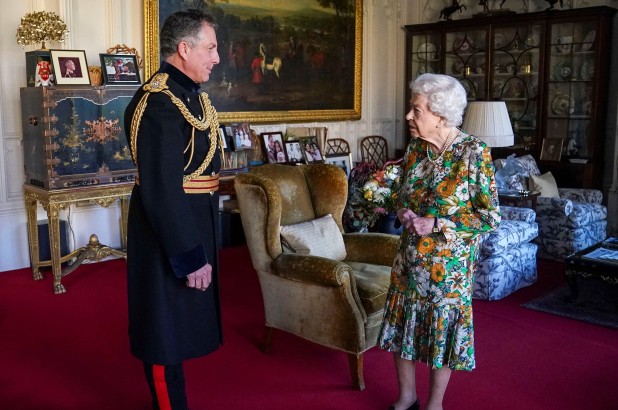Queen Elizabeth tests positive for COVID-19

Queen Elizabeth of England
- Elizabeth, 95, experiencing cold-like symptoms
- Queen intends to continue light duties
- Queen has been fully vaccinated
- PM Johnson wishes queen full recovery
Queen Elizabeth tested positive for COVID-19 on Sunday, sharpening concerns about the health of the world’s longest-reigning monarch two weeks after she marked 70 years on the British throne reports Reuters.
The 95-year-old queen, who has been fully vaccinated against coronavirus, quipped just four days ago to Palace staff that she could not move much, and she spent a night in hospital last October for an unspecified ailment.
“The Queen has today tested positive for COVID,” the Palace said. “Her Majesty is experiencing mild cold like symptoms but expects to continue light duties at Windsor over the coming week.”
“She will continue to receive medical attention and will follow all appropriate guidelines,” the Palace said.
A number of staff have tested positive for COVID-19 at Windsor, the ancient castle where Elizabeth, the world’s oldest monarch, spent much of her time during lockdowns designed to contain the pandemic.
Philip, the queen’s husband of more than 70 years, died in April last year, aged 99.
Their son, Charles, 73, the heir to the throne, earlier this month contracted COVID-19 for a second time. He had met the queen days before.
British Prime Minister Boris Johnson, who has said he nearly died from COVID-19 in 2020, was due to scrap coronavirus self-isolation rules as part of a “living with COVID” strategy that aims to achieve a faster exit from the pandemic than other major economies.
“I’m sure I speak for everyone in wishing Her Majesty The Queen a swift recovery from COVID and a rapid return to vibrant good health,” Johnson said on Twitter.

DEVOTION TO DUTY
The queen quietly marked the 70th anniversary of her accession to the British throne in early February.
Elizabeth became the queen of Britain and more than a dozen other realms including Australia, Canada and New Zealand on the death of her father King George VI on Feb. 6, 1952, while she was in Kenya on an international tour.
She is the first British sovereign to spend seven decades on the throne in a dynasty that traces its origins back almost 1,000 years to Norman King William I and his 1066 conquest of England.
Elizabeth’s achievement has been to maintain the popularity of the British monarchy in the face of seismic political, social and cultural change that threatened to make the world’s most famous royal family an anachronism.
When she ascended the throne, Josef Stalin, Mao Zedong and Harry Truman were running the Soviet Union, China and the United States, respectively, while Winston Churchill was British prime minister.
Including Churchill, she has been served by 14 prime ministers – a quarter of the number in Britain since Robert Walpole 300 years ago. During her reign, there have been 14 U.S. presidents, all of whom she has met bar Lyndon Johnson.
Elizabeth’s quiet devotion to duty has won her support and respect in the United Kingdom, and the broader Commonwealth, in contrast to the scandals that have engulfed other members of the royal family.
“She’s an icon, she’s an icon of the UK: she is an epitome of the UK in some ways, most people in the country have never known any monarch other than her,” Steven Stepanian, who works as a consultant in London, told Reuters.
Shashi Vandrevala, a 72-year-old retiree, said: “She has to get better, we can’t afford to lose her yet.”
Related
ROYAL FUTURE
The queen has in recent years attempted to pass more duties to her heir, Charles, and to his eldest son, Prince William, and his wife, Kate.
There are, though, concerns about the future. Such is the depth of respect for the queen that while she lives, the institution will be safe. What will follow is less certain.
Supporters see the queen as a unifying figure who bolsters Britain’s prestige and economy. Opponents say the institution is a bastion of undeserved privilege, funded in part by taxpayers and undermined by some members’ behaviour.
Prince Andrew, Elizabeth’s second son, last week settled a lawsuit by Virginia Giuffre accusing him of sexually abusing her when she was a teenager. Andrew, a former associate of Jeffrey Epstein, has denied accusations that he forced Giuffre to have sex at age 17 more than two decades ago.
Meanwhile, Prince Harry, once the Windsors’ most popular member, and his American wife Meghan gave up their royal duties to move to Los Angeles. Meghan last year said concerns within the family had raised over the skin colour of their son.
She also accused the family of neglect, saying she ended up with suicidal thoughts after pleading for help and getting none. The queen said some recollections may vary.
For many British people, though, the queen is very special.
As news of her COVID-19 infection spread, message boards in the London underground stations carried a goodwill message to the monarch, urging her to relax with her dogs.
“Get better soon Your Majesty – chill out with the Corgis,” the message read. “Get plenty of rest. You’re simply the best. Thanks for being such a wonderful queen.”

